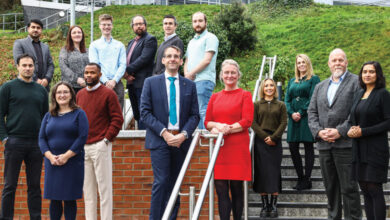Bridging global AI capabilities with local expertise for public sector in Northern Ireland

In an era where artificial intelligence (AI) is reshaping industries and public sectors worldwide, the ideal solution is a transformation partner that can cocreate next level innovation that is secured and delivered by local expertise.
By leveraging cutting-edge advancements and best practices from around the world, while maintaining a deep understanding of local needs and challenges, such a partner can deliver transformative solutions that drive meaningful progress and sustainable growth.
Unleashing the potential for Northern Ireland to lead the way in transformative AI is key to establishing the region’s position as an AI maker at the frontier of AI capabilities. In January 2025, the UK Government unveiled its AI Opportunities Action Plan – an exciting and bold statement of intent. The International Monetary Fund projects that AI could boost UK productivity by 1.5 per cent annually, adding £47 billion in economic value.
This plan lays out a comprehensive vision, addressing infrastructure, practical applications, and collaboration. It is a promising framework, but the real challenge will be delivering measurable outcomes. What sets this plan apart is its emphasis on infrastructure, which is vital for long-term success.
Proposals for AI growth zones, a twentyfold expansion of public computing power, and the creation of a National Data Library show a clear understanding that innovation requires robust foundations. AI relies on data, computational power, and collaboration, and these initiatives aim to provide all three.
The quiet power of practical AI
One of the more energising aspects of the plan is its focus on tangible, everyday applications of AI. From assisting teachers with lesson planning to detecting potholes through computer vision, the Government showcases use cases that are practical and impactful. These might not grab headlines like autonomous vehicles or conversational AI, but they highlight where AI delivers real value – by streamlining processes, reducing administrative burdens, and enabling better decision-making. It is these kinds of “quiet” innovations that will drive meaningful improvements in productivity and public services.
Collaboration Is key
The private sector’s confidence in the UK’s AI potential is another significant advantage. With £14 billion already committed to AI-related investments, it is clear that businesses are ready to play their part.
This kind of private-public synergy is exactly what is needed to accelerate progress, but collaboration must extend beyond funding. It is about sharing expertise, aligning on objectives, and fostering a robust talent pipeline to ensure that skills match ambitions. Upskilling workers, empowering leaders, and fostering AI literacy across sectors will be critical to achieving the plan’s goals.
Delivering on ambition
What is most encouraging about the action plan is its sense of direction. It is ambitious but grounded, forward-thinking but pragmatic. By focusing on infrastructure, practical applications, and collaboration, it sets a strong foundation for success.
However, ambition is only the beginning; the real measure of this plan’s success will be its ability to deliver results. Can it translate bold ideas into cost savings, productivity gains, and improved public services? Early wins will be crucial for building momentum, securing continued investment, and sustaining public confidence.
Global reach, local impact
Northern Ireland has already embarked on the journey and has the potential to blaze the trail in AI development and deployment; the region’s IT sector, close links to public services, and collaboration with universities create a fertile ground for AI innovation.
Initiatives like The Artificial Intelligence Collaboration Centre, which is a £16.3 million investment led by Ulster University and in partnership with Queen’s University Belfast are key to making this happen. Version 1 ensures that the latest advancements in AI are accessible across Northern Ireland’s public sector through a 500 strong team based in its Northern Ireland headquarters. This includes a dedicated AI Lab – a team of experts including researchers, engineers, analysts, testers, architects and advisors who work alongside data specialists across analytics, platform architects, data experts and delivery managers, all innovating differently for customers adopting AI.
This expertise is underscored by collaboration with global technology partners like Oracle Consulting. All of this is based around human-centred design, cocreating solutions with customers that span infrastructure, education, social good, inclusivity, and promote industry disruption. This is validated by multiple awards and certifications from third parties such as sourcing advisory organisation ISG, who ranked Version 1 as a global leader in Generative AI services and Oracle Cloud and Technology. That is the true power of a partner that can offer global reach but with a robust local presence, ensuring the knowledge and expertise is rooted in Northern Ireland so the region can continue to lead the way into the future.
Version 1’s unique blend of global capability and local expertise positions it as a leader in AI for the public sector, not just driving progress in Northern Ireland but setting the benchmark for the sector. The stakes are high, but so is the potential.
If Northern Ireland can fully embrace this vision, it will not only establish itself as a leader in AI but also demonstrate how the public sector can harness technology to achieve transformative progress.
Choosing the right partner to advance this agenda is not just important – it is critical.
Colm Gillard
Managing Director – Enterprise Applications
E: colm.gillard@version1.com






